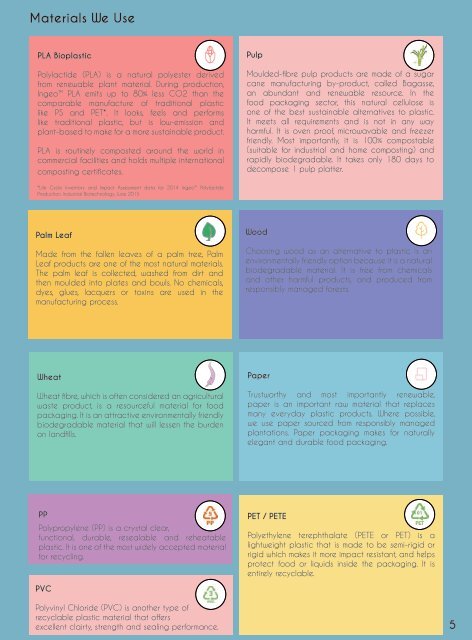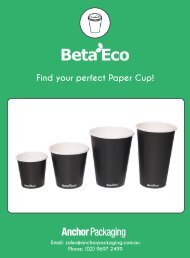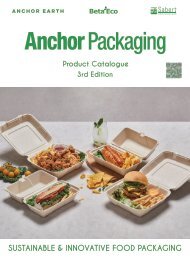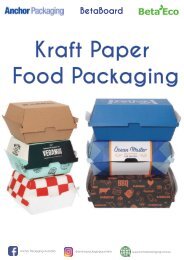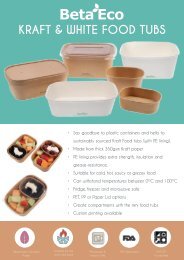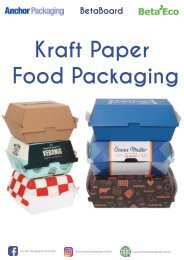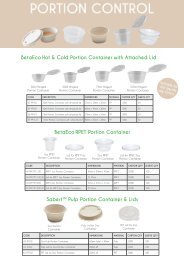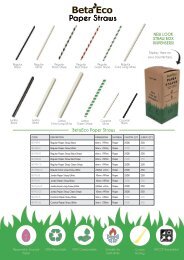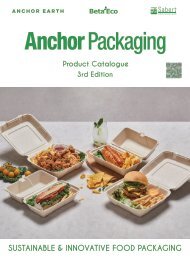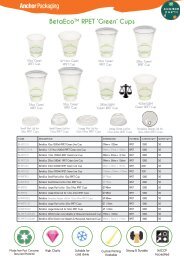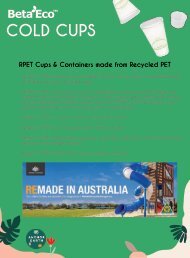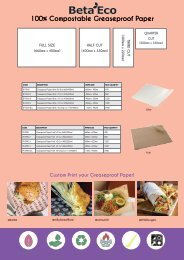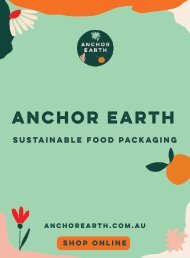SUSTAINABLE FOOD PACKAGING PRODUCT CATALOGUE
Sustainable Food Packaging for home delivery and takeaway food.
Sustainable Food Packaging for home delivery and takeaway food.
Create successful ePaper yourself
Turn your PDF publications into a flip-book with our unique Google optimized e-Paper software.
Materials We Use<br />
PLA Bioplastic<br />
Polylactide (PLA) is a natural polyester derived<br />
from renewable plant material. During production,<br />
Ingeo PLA emits up to 80% less CO2 than the<br />
comparable manufacture of traditional plastic<br />
like PS and PET*. It looks, feels and performs<br />
like traditional plastic, but is low-emission and<br />
plant-based to make for a more sustainable product.<br />
PLA is routinely composted around the world in<br />
commercial facilities and holds multiple international<br />
composting certificates.<br />
Pulp<br />
Moulded-fibre pulp products are made of a sugar<br />
cane manufacturing by-product, called Bagasse,<br />
an abundant and renewable resource. In the<br />
food packaging sector, this natural cellulose is<br />
one of the best sustainable alternatives to plastic.<br />
It meets all requirements and is not in any way<br />
harmful. It is oven proof, microwavable and freezer<br />
friendly. Most importantly, it is 100% compostable<br />
(suitable for industrial and home composting) and<br />
rapidly biodegradable. It takes only 180 days to<br />
decompose 1 pulp platter.<br />
*Life Cycle Inventory and Impact Assessment data for 2014 Ingeo Polylactide<br />
Production. Industrial Biotechnology, June 2015<br />
Palm Leaf<br />
Made from the fallen leaves of a palm tree, Palm<br />
Leaf products are one of the most natural materials.<br />
The palm leaf is collected, washed from dirt and<br />
then moulded into plates and bowls. No chemicals,<br />
dyes, glues, lacquers or toxins are used in the<br />
manufacturing process.<br />
Wood<br />
Choosing wood as an alternative to plastic is an<br />
environmentally friendly option because it is a natural<br />
biodegradable material. It is free from chemicals<br />
and other harmful products, and produced from<br />
responsibly managed forests.<br />
Wheat<br />
Wheat fibre, which is often considered an agricultural<br />
waste product, is a resourceful material for food<br />
packaging. It is an attractive environmentally friendly<br />
biodegradable material that will lessen the burden<br />
on landfills.<br />
Paper<br />
Trustworthy and most importantly renewable,<br />
paper is an important raw material that replaces<br />
many everyday plastic products. Where possible,<br />
we use paper sourced from responsibly managed<br />
plantations. Paper packaging makes for naturally<br />
elegant and durable food packaging.<br />
PP<br />
Polypropylene (PP) is a crystal clear,<br />
functional, durable, resealable and reheatable<br />
plastic. It is one of the most widely accepted material<br />
for recycling.<br />
PET / PETE<br />
Polyethylene terephthalate (PETE or PET) is a<br />
lightweight plastic that is made to be semi-rigid or<br />
rigid which makes it more impact resistant, and helps<br />
protect food or liquids inside the packaging. It is<br />
entirely recyclable.<br />
PVC<br />
Polyvinyl Chloride (PVC) is another type of<br />
recyclable plastic material that offers<br />
excellent clairty, strength and sealing performance. 5


